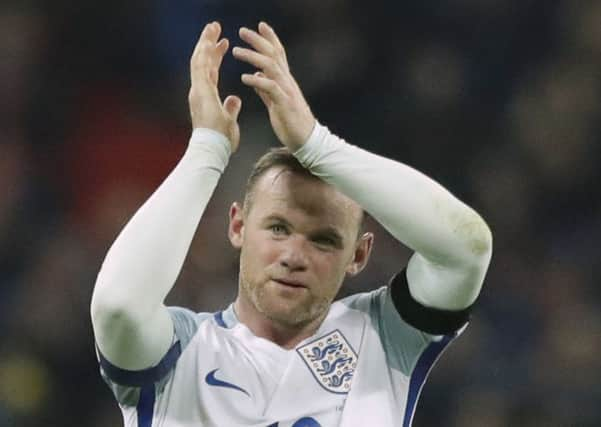Wayne Rooney bows out a winner as he quits England on own terms


In this instance, Wayne Rooney, who called time on his England career yesterday, is the winner and Gareth Southgate the loser.
Southgate had phoned England’s all-time top goalscorer on Tuesday, informing the 31-year-old forward that he wanted to include him in his upcoming squad following his fine start to life back at boyhood club Everton.
Advertisement
Hide AdAdvertisement
Hide AdHowever, the England manager was left disappointed, Rooney telling Southgate of his decision to quit international football for good in the same phone conversation
It says much about Rooney’s effervescent return to Everton that England might miss him, which was unthinkable when Southgate looked beyond him last time he named a squad.
The theory was that Rooney had chosen Everton over a pension-booster in China and the United States in order to prolong his international career. Now it seems turning out for Everton as a starter not a bench-warmer, as he had become at Manchester United, is engagement enough.
He would not be the first to leave Old Trafford in his dotage to find meaningful expression elsewhere. Gordon Strachan looked spent when he quit United for Leeds in 1989 aged 32, yet went on to spend five years at Elland Road, a period that saw him beat his old team-mates to the championship in the final year of the old First Division.
Paul McGrath, too, enjoyed a productive seven years at Aston Villa post Old Trafford, despite the view of Sir Alex Ferguson that lifestyle issues and a chronic knee condition had put him beyond use at the age of 29.
Rooney had become a peripheral figure at United under Jose Mourinho, unable to make an impact even when he came off the bench. His incremental removal from the centre of things hurt him mentally and physically, making him slower in thought and action when he was introduced.
Suitably re-engaged at Goodison Park, the sense of renewal about Rooney is palpable. Two cracking goals in the opening two games amounted to a restatement of his credentials as a footballer of the highest class, not a washed-up old pro clinging to past glories.
Suddenly he looks like the player who scored more goals for United and England than the great Sir Bobby Charlton; in other words one of the best his country has produced.
Advertisement
Hide AdAdvertisement
Hide AdIt is not only his goals that have given Everton a lift. His influence about the club has had a galvanising effect on those around him, particularly Tom Davies, who orbits Rooney like a satellite on the pitch, which is a good thing since it means he is always in the right place.
How fitting it would be were Rooney’s withdrawal from the international picture to lead to the elevation of Davies, whose nerveless demeanour indicates a player at ease in the elite environment, which is half the battle with England.
You can bet your last penny that Rooney will be sitting on the sofa either as part of a television panel or at home waving his scarf with his boys cheering on the white shirt the next time that England are playing.
His is an old fashioned attachment to the game and the England proposition, as much a fan as he was a player.
In numbers at least Rooney has given more than any to the England cause, with a record 119 caps for an outfield player and an unprecedented 53-goal haul.
Rooney, though, and the generation of which he was a central part, could not return England to the summit of the international arena.
If those metatarsals had stayed healthy at his peak, it might have been different. Might.